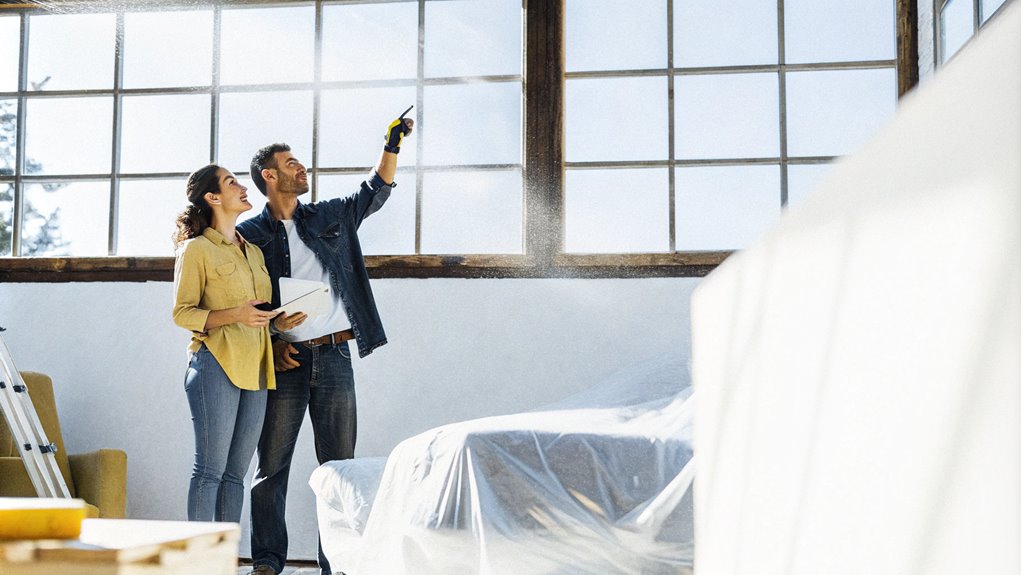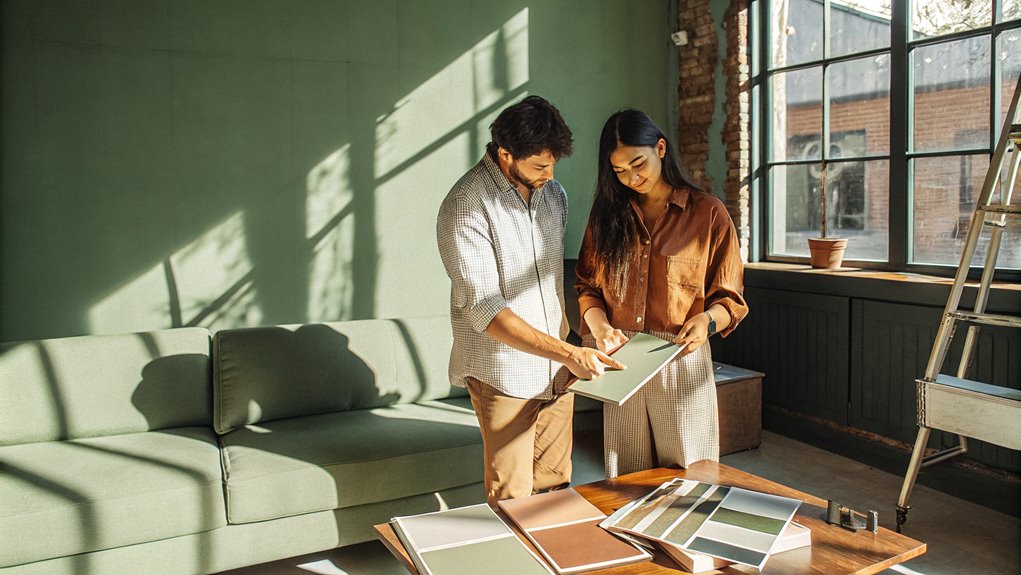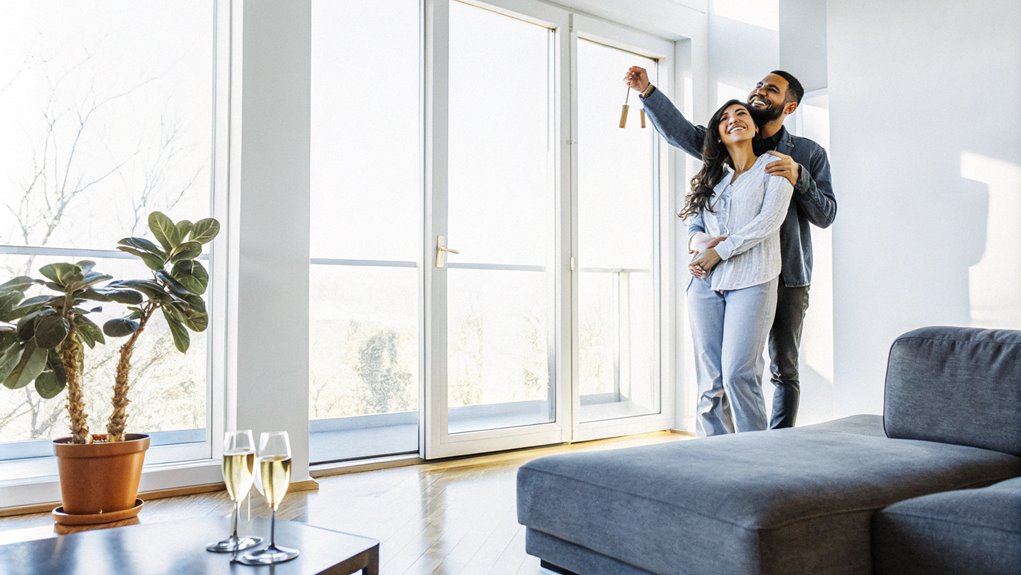Want to buy your first home? There's a special loan that can help. It's called the FHA 203(k) loan.
This loan is different. It pays for both your house and the fixes it needs. You only need to put down a small amount – just 3.5% of the total cost. Your credit score needs to be 580 or higher.
Many buyers skip houses that need work. But with this loan, you can buy them. The loan will pay to fix up the house. You can do small fixes or big ones.
The best part? You only need one loan. The bank looks at what your house will be worth after you fix it up. This means you can borrow more money now.
This loan can open doors to homes you didn't think you could buy. Now you can turn a fixer-upper into your dream home.
Ready to start building equity in your own Michigan home? Get your personalized home loan quote today.
What Is an FHA 203(k)?

Want to buy a fixer-upper home? The FHA 203(k) loan can help. It lets you get one loan to buy a house and fix it up. You don't need two separate loans.
You can pick from two types of 203(k) loans. The bigger one, called Standard, is for big fixes that cost more than $35,000. The smaller one, called Limited, is for fixes up to $35,000. You can use the money to make your kitchen better, fix your roof, or add new wiring.
The best part? You only need to put down a small amount – just 3.5% of the total cost. Your credit score needs to be 580 or higher.
This makes it easy to turn an old house into the home you've always wanted.
Michigan residents, unlock the door to your new home. Request your home loan quote from Treeside Financial today.
Why Traditional Mortgages Fall Short
Let's talk about why regular home loans don't work well for fixer-uppers.
Banks want homes to be ready to live in right away. They like homes where everything works well and nothing is broken. This makes it hard when you want to buy a house that needs some love.
If you find an old house you want to fix up, you'll run into two big problems with regular loans.
Banks won't give you money for a house that needs lots of fixes. And if you do get money to buy it, you'll need to get another loan to fix it up. This means you pay twice as much in fees and higher rates.
Many people who want to buy their first home can't get the houses they want because of this. Some of these houses could be perfect with just a little work.
You might be closer to buying your home than you think
Take our 2-minute home buyer readiness quiz to see how prepared you really are – no credit check required.

The Power of Combined Financing

Getting your dream home is easier when you join two loans into one. This helps you buy a house and fix it up all at once. You won't need to deal with many loans – just one simple payment each month.
This table shows why one loan is better than two:
| Feature | Traditional | Combined Financing |
|---|---|---|
| Down Payment | More money now | Less money now |
| Fix-up Money | Extra loan | Part of house loan |
| Loan Fees | Pay twice | Pay once |
| Monthly Bills | Two bills | One bill |
Many people like you are finding this smart way to buy homes that need work. You can borrow money based on what the house will be worth after you fix it up. This means you can buy better homes that you might not get with a normal loan.
Finding Hidden Property Gems
Looking for a great home deal? You can find special houses that most people miss. Think about homes from estate sales or homes that stopped being for sale. Not many people look at these, so you might get a better price.
Find a friendly local agent who knows about homes that aren't for sale yet. Join groups in your area where people talk about houses. Sometimes, owners tell these groups they want to sell before they tell everyone else.
Don't walk away from homes that just need a little work. Some buyers don't want houses with old wallpaper or worn-out carpet. But you can fix these things easily and save money.
The best deals come from people who need to sell fast or haven't shown their house to many buyers yet.
Calculating Your Renovation Budget

Your home fix-up needs a good plan. Let's make it simple!
Money for home changes comes from many places. You need cash for workers, stuff to build with, and papers from the city. Things can go wrong too, so save extra money – about 20% more than you think you'll need.
To know how much money you'll spend:
- Ask many workers how much they'd charge
- Look at stores big and small for the best prices
- See how much city papers cost
- Think about where you'll stay if you can't live at home during the work
Fix the big stuff first! Make sure your home is safe before you make it pretty.
Just don't spend so much that your home costs more than others in your area.
Watch your dollars and make smart choices. This way, your home will be better and worth more when you're done.
Common Eligible Home Improvements
Let's talk about making your new home better! You can get help paying for some home fixes that make your house nicer and save money on power bills.
These fixes can help:
- New windows that keep heat in
- Better air heating and cooling
- New kitchen stuff
- Solar panels on your roof
- More wall padding to stay warm
Pick fixes that make your home feel good and save you money. The best ones help cut your power bills. Smart buyers fix big problems first, like broken stairs or bad wiring, before they make things look pretty.
| Fix | Can You Get Help? |
|---|---|
| New windows | Yes – tax help |
| New AC/heat | Yes – if energy star |
| Kitchen work | Some help |
| Solar panels | Yes – full help |
| More insulation | Yes – energy help |
The Application Process

Ready to get your house? Let's get your papers in order.
You need to show:
- Your pay stubs
- Your tax papers
- Bank papers
- Papers that show what you own
When you apply matters a lot. Rates change every day.
Also, your OK-to-buy letter only lasts 2-3 months.
Take your time to read all the papers before you sign.
Make sure you know how much you need to pay. This way, you won't get any big surprises later.
Pre-Approval Documents Required
When you want to buy a home, you need to show the bank some papers first. This helps them see if you can pay for a house. Having your papers ready shows you're ready to buy.
You need these papers:
- Your W-2 forms and tax papers from the last two years
- Pay slips from your last month of work
- Bank papers from the past two months
- Papers that show other money you have or owe
When you have all these ready, the bank can work faster to help you. Other people who want to buy homes mightn't be as ready as you. This makes you look good to home sellers.
Being ready with your papers helps you get a home faster. The bank will see you're serious about buying a house.
Timing Is Everything
Getting ready to buy a home takes time. Start your home loan papers three months before you want to buy. This helps you fix any money problems and get all your papers in order.
If you rent now, think about when your lease ends. Start looking for homes two months before your lease is up. This way, you won't have to pay rent and a home loan at the same time.
Keep an eye on loan rates. Small changes in rates can make your monthly bill bigger or smaller. If rates go down while you're looking, you can get the lower rate. If rates go up, you keep your old rate.
Read Before Signing
Before You Sign Your Home Papers
Getting a home means signing lots of papers. These papers will affect your money for many years. You need to read each one with care.
Take as much time as you need. Make sure you know what each paper means. Your helper at the bank should answer all your questions.
Things to check:
- Look at how much money you'll pay now and later
- Make sure your name, job, and money details are right
- Check the home address and price are correct
- Know when you need to pay each month
Ask for copies of all papers you sign. Keep them safe at home.
Working With Approved Contractors
Choosing the right workers for your home is a big deal. You want people who do great work and who your bank trusts.
Look for these five key things:
- Does the worker have a permit to do the job?
- Do they have money to fix things if they break?
- What homes have they fixed before?
- Can you talk to happy house owners?
- Will your bank say yes to them?
Ask to see their papers. Make sure they are real. Most banks have a list of workers they like. These workers know what banks want to see. When you pick someone from the bank's list, things go faster. It also helps you get better deals on your house loan.
| What to Check | Why It Counts |
|---|---|
| Work Permit | Shows they follow rules |
| Safety Plan | Keeps your home safe |
| Old Jobs | Shows good work |
| Happy Clients | Shows trust |
| Bank Says Yes | Helps get your loan |
Success Stories and Real Examples

Meet real people who did great things with their first homes. Let me tell you about Sara and Mike. They'd friends who fix houses, and they helped turn an old house into something new and pretty.
Then there's James, who saved lots of money by working with good builders his realtor knew.
Here are more happy stories:
- A couple in Denver fixed up an old house and made money selling it
- A mom in Atlanta saved big money on house repairs
- New buyers in Seattle stayed safe from costly mistakes
- A young guy in Austin got a new kitchen for less money
What do all these stories tell us? Having good friends who know about houses helps a lot. Working with people who know what they're doing makes buying a house much better.
Making Your Offer Stand Out
Want your home offer to be the best? Here is how to make sellers pick you.
In today's busy market, you need to do more than just offer a good price. You want to show sellers why you're the right choice. Think of it like a gift – it needs good wrapping to look special.
What Makes Your Offer Better:
Money Proof
- Show the bank says you can buy
- Get this paper before you look at homes
Smart Timing
- Let the seller pick when to move
- Be open to their needs
Keep It Simple
- Don't ask for too many things
- Make home checks quick
Write a Nice Note
- Tell them why you love their home
- Keep it short and sweet
Show You Mean It
- Put down more cash up front
- This shows you're serious
These simple steps will help your offer catch the seller's eye. They show you're ready to buy and care about doing things right.








